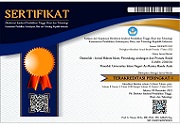ANALYSIS OF ISLAMIC LAW ON ELECTRONIC CONTRACTS BASED ON GOVERNMENT REGULATION NUMBER 80 OF 2019 CONCERNING TRADE THROUGH ELECTRONIC SYSTEMS
Abstract
The mode of trading transactions continues to develop day by day, one of which is the presence of trading transactions through electronic systems. Sellers and buyers no longer need to meet face to face to carry out buying and selling transactions, but can be created remotely and form agreements using electronic media. The Indonesian government has issued special regulations governing trade transactions through this electronic system, namely Government Regulation Number 80 of 2019 concerning Trading Through Electronic Systems, and the rules regarding electronic contracts are contained in articles 50 to 57. This study aims to find out how the regulations regarding electronic contracts in PP No. 80 of 2019 and the view of Islamic law on electronic contracts. The type of research used is library research, with the primary sources of this research being Government Regulation Number 80 of 2019, the Civil Code, and fiqh books. While secondary sources include writings on electronic contracts in the form of books, journals, and other writings related to electronic contracts. The result of this research is that electronic contracts in PP No. 80 of 2019 are created when the parties mutually agree to carry out trading transactions using an electronic system. Regarding the mechanism of the contract itself, it is left to the parties to determine what kind of contract they want. Electronic contracts in muamalah contracts as regulated in PP No. 80 of 2019 from the perspective of Islamic law is legal and permissible, in accordance with fiqhiyah rules, namely the law of origin of muamalah is permissible (al-ibahah) as long as there is no evidence that prohibits it. Electronic contracts, in this case, are legal and permissible according to Islam as long as they fulfill the pillars and conditions of the contract (akad) and there are no elements that are invalidated and damaged by it such as fraud, coercion, usury and etc.
Keywords
Full Text:
PDFReferences
M. Arsyad Sanusi, “Transaksi Bisnis dalam Elektronik Commerce (E-Commerce): Studi Tentang Permasalahan Hukum dan Solusinya, Jurnal Hukum. No.16 Vol 8, Maret 2001.
Cita Yustisia Serfiani, Buku Pintar Bisnis Online dan Transaksi Elektronik, Jakarta: Gramedia Pustaka Utama, 2013.
Deky Pariadi, “Pengawasan E-Commerce dalam Undang-Undang Perdagangan dan Undang-Undang Perlindungan Konsumen”. Jurnal Hukum dan Pembangunan, Tahun ke-48, No.3. Juli-September 2018.
Abdul Manan, Hukum Ekonomi Syariah (Dalam Perspektif Kewenangan Peradilan Agama), Jakarta: Kencana, 2012.
Syamsul Anwar, Hukum Perjanjian Syariah, Jakarta: RajaGrafindo Persada, 2007.
Ibn al-Qayyim, I’lam al-Muwaqqi’in, Jilid 1, Beirut: Daar al-Kutub al-Ilmiyah, 1996.
Oni Sahroni, Fikih Muamalah: Dinamika Teori Akad dan Implementasinya dalam Ekonomi Syariah, Jakarta: Raja Grafindo Persada, 2016.
https://www.bps.go.id/publication/2020/12/24/2548417ddc6dab8247553124/statistik-e-commerce-2020.html, diakses pada 17 Juni 2021
https://www.cnbcindonesia.com/tech/20210122114013-37-217989/bi-proyeksi-transaksi-e-commerce-tahun-ini-tembus-rp-337-t, diakses pada 17 Juni 2021
Asril Sitompul, Hukum Internet, Bandung: Citra Aditya Bakti, 2001.
Azhar Muttaqin, “Transaksi E-Commerce dalam Tinjauan Hukum Jual Beli Islam”, Ulumuddin, Vol VI. Tahun IV. Januari-Juni 2010.
Carolina Novi Budiman, “Kekuatan Mengikat Perjanjian Dalam E-Commerce (Electronik Commerce)” Lex Privatum 2, No.2. 2014.
Peraturan Pemerintah Nomor 80 Tahun 2019 Tentang Perdagangan Melalui Sistem Elektronik
Peraturan Pemerintah Nomor 82 Tahun 2012 Tentang Penyelenggaraan Sistem Transaksi dan Elektronik
Dewan Syariah Nasional Majelis Ulama Indonesia, Fatwa No: 110/DSN-MUI/IX/2017 tentang Akad Jual Beli.
DOI: http://dx.doi.org/10.22373/dusturiyah.v12i1.12295
Refbacks
- There are currently no refbacks.
Copyright (c) 2022 Ida Friatna, Azka Amalia Jihad. Muhammad Riza.
All papers published in Dusturiyah: Jurnal Hukum Islam, Perundang-undangan dan Pranata Sosial are licensed under a Creative Commons Attribution-ShareAlike 4.0 International License. |
Office address: Fakultas Syariah dan Hukum Universitas Islam Negeri Ar-Raniry. Jl. Ar-Raniry, Kopelma Darussalam, Syiah Kuala, Banda Aceh, Aceh, Indonesia 23111. Email: [email protected]















